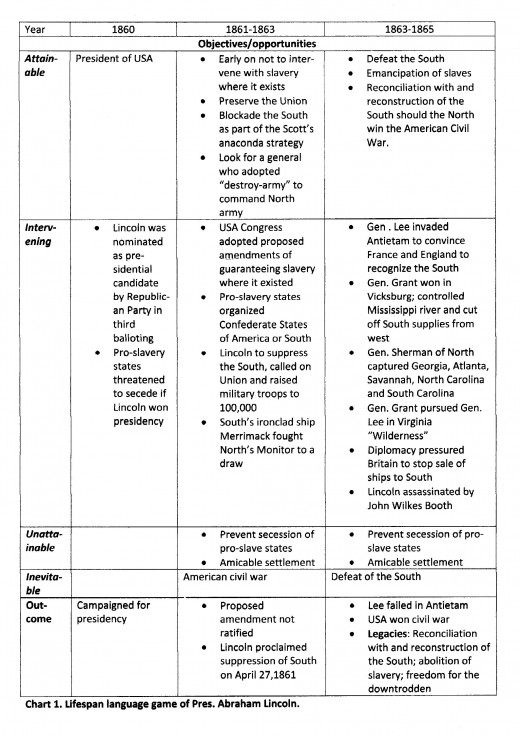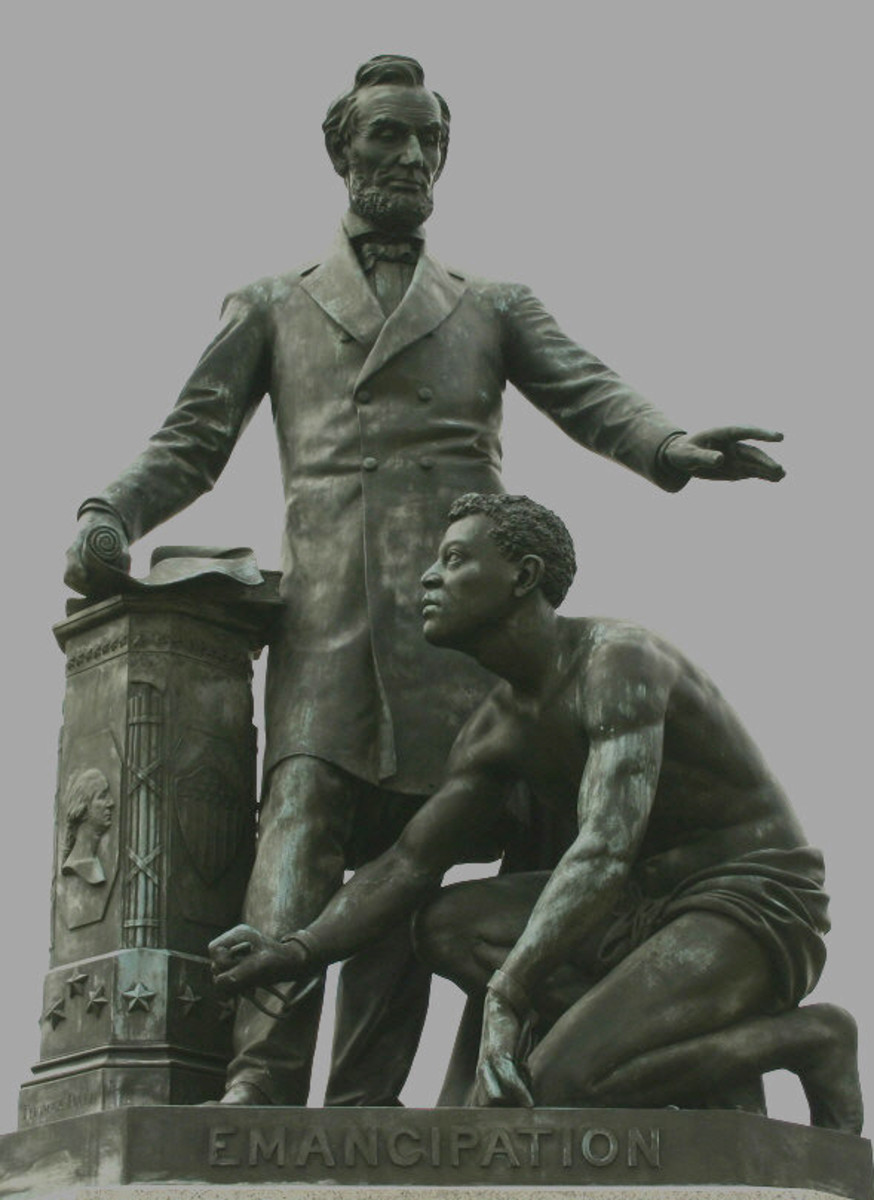Lifespan Language Game of Pres. Abraham Lincoln Shows His Legacy
A lifespan language game can serve as a planner
Monism
The statement or sentence “My future will never be behind me” is tautological.
That is if we define “future” as something ahead; and “behind” as something of the past.
The concepts are monistic in that the terms are very big baskets, so to speak.
I enumerate some of my past as: gone to primary school; gone to elementary school; finished high school; completed college.
I enumerate some of my future, something that I plan to do, or something that will come my way whether I like it or not: pay tax; set up a business; buy an electric car; write a history of Luna town.
I have an aversion to big baskets, or classes. The main reason is that a class is not a thing. This is derived from the definition of mathematics as propounded by Bertrand Russell and Alfred North Whitehead in their book “Principia Mathematica.” They wanted to define mathematics in terms of logic (Russell, B. Wisdom of the West. 1954:370).
The question they asked: “What is a number?
Their answer: “A number is a class of classes.
For example, zero is a class without a member. One is a class with a solitary member. Two is a class of couples.
It is easy to see that a class is not a thing. Therefore, there are more classes than there are things. If the notations 0, 1, 2 and 3 each represent a thing, there are only three things not four because 0 does not indicate a thing.
The use of class poses linguistic and reality hazards in discussions, computations, and enumerations of items. It could even mask the mistake that a class exists in definitions. That is a no-no in science, like ”autoimmune disease.” I maintain that this phrase has no member. (I have several Hubs on this topic.) That is, “autoimmune disease” is an empty class, but since it can be defined deductively, it is thought that it exists.
The lifespan language game avoids the use of terms “future” and “behind” in the way of classes. If ever they are used, items that belong in them should be mentioned and assured that a description of each is given and existence is asserted on it.
It may turn out that a lifespan language game can be used as a guide like a diary or a planner. It may egg one to focus on his/her objectives; identify opportunities; evaluate those that are attainable, unattainable, and inevitable. Intervening are unforeseen or are forced upon us by the environment for which one should have the equipment to parry if adverse or pursue if desirable.
In science, monism does not make for advances. The dialectics of Hegel is a monism (Russell, B. Wisdom of the West. 1954:380-81). One doctor of medicine I have found using it, may be unaware of its philosophical background or its scientific implications, says that an autoimmune disease occurs when the immune system attacks a “not-self.” The assumption starts with the “self” that the immune system is familiar with. It it finds something that is “not-self” it attacks it. What is that “not-self?” How explain it? What is the theory of “not-self?” it is found in monism.
Dialectics
“Self” in dialectics proceeds like so:
“Self” comes in conflict with itself and transforms into a “not-self.” “ Not-self” comes in conflict with itself and transforms into a “self.” “Self” comes in conflict with itself and transforms into a “not-self.” “Not-self” gets in conflict with itself and transforms into “ self.” And so forth and so on. Each conflict causes a lift one step higher.
Dialectics became popular because Marx applied it in analyzing and predicting the fate of capitalism. Its logic conferred certainty to his analysis, Marx believed. Marx said the state will end in its disappearance. That prediction was also welcome since a lot of people are averse to being governed with the assumption that disappearance of the state will mean peace and order. However, the state (USSR) that Lenin built upon historical dialectics ended in collapse and in chaos.
Mao Tse-tung, former chairman of China, (the other socialist) gave a different interpretation of dialectics. It is a kind of assumption that is to be proven by action and verification; not allowing its internal logic to dictate action and policy. For one, he replaced the concept “proletariat” with “peasants.”
The sad thing is that conventional medicine says there is no cure for autoimmune disease also known as degenerative disease. And there are a lot of autoimmune disease like rheumatic heart, cancer, diabetes, lupus, emphysema, motor neuron disease or amyotrophic lateral sclerosis, multiple sclerosis, Alzheimer’s disease, and many more. It appears that the lack of cure for such diseases is owing to the use of the wrong framework.
Language game of the American Civil War
The war has a language game of its own. Wittgenstein said the public plays a large role in its development. A person surrounded by his people learns a language from them. Let’s take cromagnon who did not know a term to start with. He accidentally touches the flame of a candle. His mother says, “fire.” Cromagnon learns how a fire looks like and the heat he feels from touching it. His father points to a patch of color and says “red.” Cromagnon learns how “red” looks like. When he sees a similar patch of color he calls it “red.” His brother says “jump” and jumps. Cromagnon learns the action “jump” and jumps when his brother tells him “jump.”
“South” is a term whose meaning you may not know if you were not around during the civil war mingling with people in the USA. You may think it is the direction pointed to by a compass. “South” means the 11 slave-owning states of USA that organized the Confederate States of America in February 1861.
“North” is another term that can be mistaken simply to mean opposite that of “South.” ”North “ means the 23 states of USA that wanted to abolish slavery.
“South” has another meaning in the language game of climate change. It means poor countries or developing countries.
The lifespan language game of Lincoln is easy to understand if you read literature of the American civil war. Why did Lincoln not use the term “South?” Why did he use the term “combinations?” You find answers in the language game of the war. I discuss these terms in my Hub “American Civil War: Factors the South should have considered before bombarding Fort Sumter of the North.”
A large part of the life of Lincoln is woven into the language game of the American civil war. The main reason is that he dealt with the issue of slavery throughout his political life. As president of USA during the civil war his thoughts, policies and actions shaped the civil war. As commander in chief, the battles fought by the generals of the North became part of his lifespan language game.
What follows is a tabular lifespan language game of Lincoln derived from “American History to 1877” edited by Robert D. Geise, published in 1992. The entries are not exhaustive.
Summary of a lifespan language game of Lincoln









